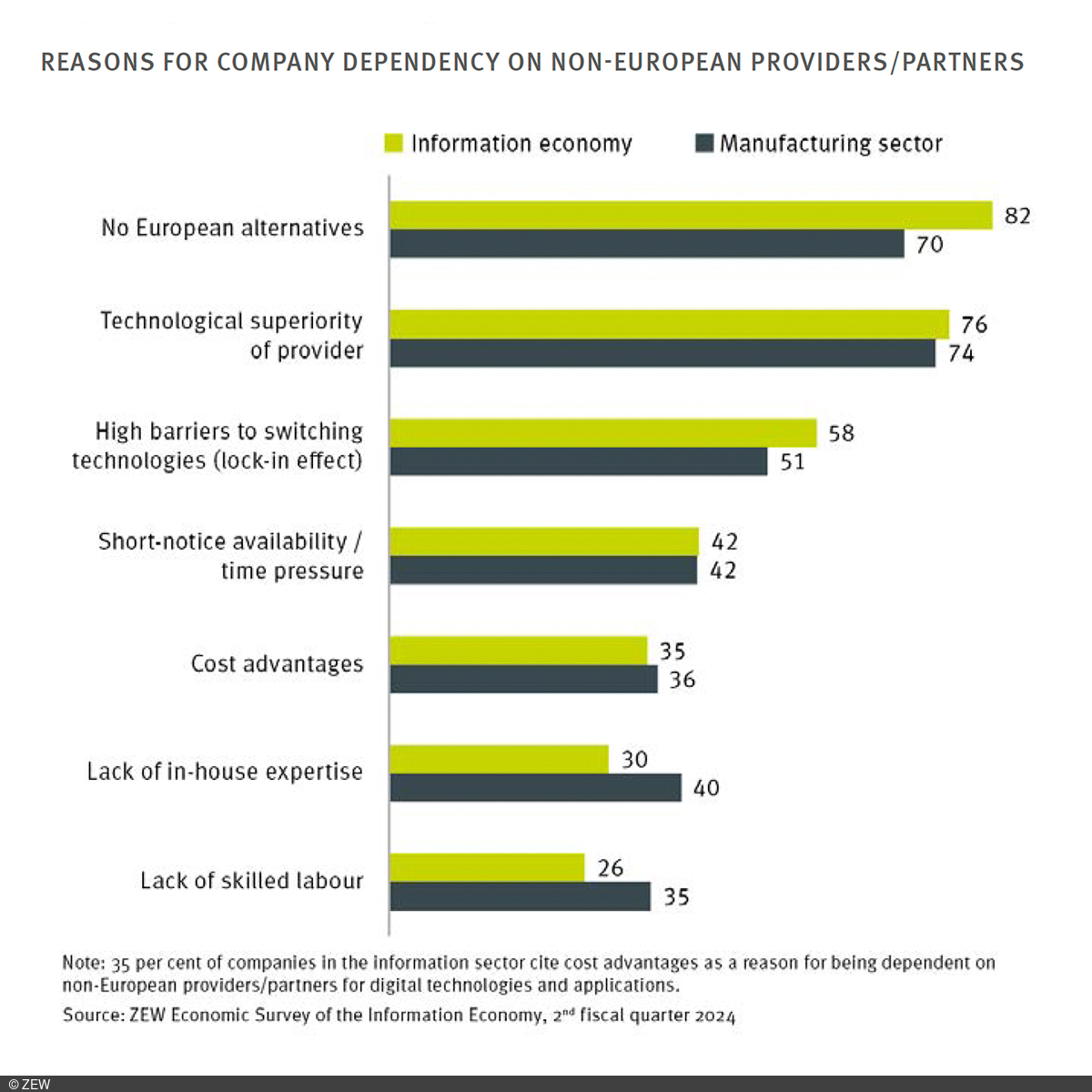EU Digital Policy: Make Up Lost Ground in the Digital Transformation
Digitalisation Potential in the EU Remains Untapped
Digital technologies play an important role in advancing other technologies and in supporting various industries. But Germany and the EU have noticeable shortcomings in the development and application of digital technologies, including in the highly dynamic field of artificial intelligence (AI). The EU has failed to tap the full potential offered by digitalisation for innovation and productivity, which is one of the main reasons for innovation gaps and weak growth exhibited by Europe in general and Germany in particular in relation to the US. More than 80 per cent of companies in Germany report being dependant on non-European providers of digital technologies and applications. The main reasons cited are the lack of European alternatives and the technological superiority of non-European providers (see chart below). Access to digital technologies without one-sided dependencies and the skills to further develop and apply them are prerequisites for European digital sovereignty. This is becoming increasingly important, not least because of growing geopolitical tensions.
The regulatory framework for digitalisation is largely set in Brussels, as the examples of the Digital Markets Act (DMA), the General Data Protection Regulation (GDPR) and the recent AI Act show. Despite the large number of regulations, there is often leeway in their implementation at the Member State level, which is at odds with the uniform application of the law. This can hinder the development and deployment of digital technologies – and, by extension, innovation. It also limits the advantages that a single digital market should be able to offer.
Recommendations
Increase Investment and Adopt Innovation-Friendly Regulation
Invest in digital infrastructure and strengthen digital sovereignty
Computing capacity is the foundation for the development and use of digital technologies, especially AI applications. In the coming years, the EU will continue to rely on the computing capacity of the US, whose lead in this area is nearly insurmountable. But Europe also needs to invest in its own capacity to strengthen its digital sovereignty and to develop and maintain the necessary competence in the field. Such investment is an important prerequisite for R&D in AI and quantum computing. A promising strategy here would be to embark on public-private partnerships that allow private investors to supplement public computing infrastructure investment – such as that provided for by the European High-Performance Computing Joint Undertaking.
Design an innovation-friendly regulatory framework
Right now, the EU Member States are focusing on the implementation of the Artificial Intelligence (AI) Act. Their aim should be to find a balance between establishing legal certainty on the one hand and fully tapping innovation potential on the other. In this connection, it is important to ensure that the implementation of the AI Act is consistent with other regulations, such as the GDPR. Practical guidelines can support small and medium-sized enterprises (SMEs) in developing and applying AI solutions that comply with the law. The Federal Network Agency, the coordinating institution for the implementation of the AI Act in Germany, should always check to see whether domestic developments are in harmony with EU provisions.
Living labs play an important role in testing innovative solutions, even when legal rules are temporarily suspended. This allows both the AI solutions to be improved and the rules of the AI Act to be adapted over time through “regulatory learning” based on new knowledge. The option of adapting regulations to dynamic technological developments in generative AI should feature centrally in the act’s implementation.
Improve data access and data usage opportunities
The application of digital technologies – including in particular AI models – requires access to data. Simplifying and harmonising the regulations governing data-handling practices can be particularly helpful for SMEs. According to the European Data Governance Act, “data intermediation service providers” are to support companies in checking and establishing compliance with European regulations. However, it is important for the process to remain quick and straightforward.
Initiatives such as the European Health Data Space can help develop better diagnoses and therapies by pooling health data. But Member States differ in their industry structures and comparative advantages. For example, the German economy is strong in Industry 4.0, and thus possesses promising data in this area. In view of such differences, actors in the Member States should set their own priorities and develop AI models tailored to their domestic economies. All of Europe wins when these specialised solutions can be used across the EU’s single digital market.
Scientific Contact


